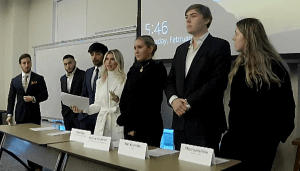Undergraduate students in a public health course at SMU honed their persuasive speaking abilities in a formal debate on reducing firearm suicide.
Gun-related deaths in the United States hit an all-time high in 2020, with a record number of gun murders and near-record gun suicides, according to new statistics from the Center for Disease Control (CDC). In 2020, more than 45,000 people lost their lives from gun-related injuries, including murders, suicides, and other types of deaths tracked by the CDC. Based on this information, the students of Dr. Eric Bing’s class Pandemics! The Science of Disease Spread, Prevention, and Control (APSM/ANTH/MNO 4344), held a debate on the topic: To reduce firearm-related suicides in the United States by 30% by 2031, should the primary focus be increasing access to mental health care or restricting access to firearms?

The students began their arguments by highlighting the significance of the topic, pointing out that many people in the United States experience mental health issues but lack access to necessary resources. One team noted that the top 3 states with the highest suicide rates share a neglect of mental health care providers, underscoring the importance of increasing access to mental health care. In contrast, opposing teams argued the dangers of firearm access, noting the quick and impulsive nature of suicide and providing data showing the increased risk of suicide with handgun access. They also cited the success of legislation like the Permit-to-Purchase (PTP) law in reducing suicide rates.

After the arguments of each side were given, the judges had a chance to ask follow up questions or for clarification, then rebuttals were given to the arguments by each side. After providing feedback to all of the teams, the judges ultimately chose the winning teams: Team 5 and Team 4.
Throughout the semester, students will keep learning and exploring global diseases, as well as discovering how epidemiologists relying on a range of academic disciplines can fight pandemics.
Interested in learning more about the Center for Global Health Impact? Visit our website, email us at globalhealthimpact@smu.edu and engage with us on Twitter.
